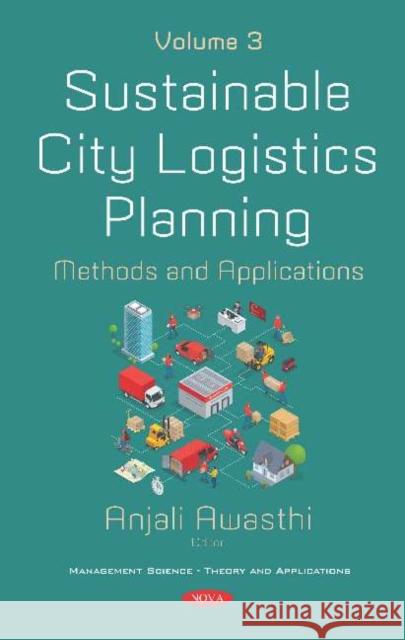Sustainable City Logistics Planning: Methods and Applications. Volume 3: Methods and Applications -- Volume 3 » książka
Sustainable City Logistics Planning: Methods and Applications. Volume 3: Methods and Applications -- Volume 3
ISBN-13: 9781536166095
Sustainable City Logistics Planning: Methods and Applications. Volume 3: Methods and Applications -- Volume 3
ISBN-13: 9781536166095
(netto: 694,33 VAT: 5%)
Najniższa cena z 30 dni: 703,93
ok. 30 dni roboczych.
Darmowa dostawa!
Modern cities are facing the growing problem of congestion, poor air quality and lack of public space. To ameliorate the condition of goods transport in cities, sustainable city logistics planning is essential. It requires a collaborative approach among city logistics stakeholders for consolidated goods distribution inside city centers to minimize their negative impacts on city residents and their environment. The book presents theoretical studies, state of the art, and practical applications in the area of sustainable city logistics. It is composed of nine chapters. A brief description of the various chapters is provided as follows: Chapter 1 by Sharfuddin Ahmed Khan and Syed Tahaur Rehman presents a review of literature and future prospects on sustainable city logistics. Globalization, governmental rules, and regulations enforce decision makers and managers to incorporate sustainability in every aspect of their decision making (DM) specifically in city logistics. The area of sustainable city logistics is still in its developing stage and not many authors explore sustainability aspects in city logistics. The focus of this chapter is to review existing literature related to city logistics that considered sustainability in DM. A total of 40 articles that were published between 2010 to 2019 have been considered and categorized in terms of objective of study, area of research focus such as qualitative, quantitative, case study etc., and multi criteria DM methods. Finally, future prospects and directions has been proposed in sustainable city logistics. Chapter 2 by SAttar Ezzati presents challenges and opportunities in maritime logistics empty container repositioning. Maritime logistics and freight transportation are extensive and complex sectors that involve large material resources and represent intricate relationships between trade-off the various decisions and policies affecting different components. Because of the globalization, e-market and high level of customization trends, the sector has faced diversified challenges on different levels of planning including designing, scheduling, fleet sizing, decisions about container ownership, leasing and empty container repositioning, uncertainty and collaboration opportunities that already has provoked advanced coordination and intelligent optimization techniques for its global operations from strategic and tactical perspectives. Large attention of this chapter concentrates on empty containers repositioning problem and potential pathways to address this issue and how container shipping companies can handle this challenge with the help of operations research techniques from the perspectives of shipping business industry. To do so, this chapter presents a comprehensive and systematic literature review mainly focused on recent publications correspond to these logistics that maritime industries are facing. Chapter 3 by Yisha Luo, Ali Alaghbandrad, Tersoo Kelechukwu, and Amin Hammad addresses the theme of smart multi-purpose utility tunnels. In terms of sustainable practices, the conventional method of open cut utility installation has proven to be a short-term solution, considering its negative impact on the environment, and its social disruptive nature. An alternative to open cut utility installation is Multi-purpose Utility Tunnels (MUTs), as it offers an economic, sustainable, and easy to manage and inspect method of utility placement. The risks associated with MUTs are both natural and manmade. As a way of tackling these risks, smart MUTs with the use of sensors will reduce the effects of the risks while supporting the operation and maintenance processes for MUT operators. To enhance decision making, data collected from the sensors are used in the MUT Information Modelling (MUTIM). MUTIM includes the utility tunnel structural model with utilities, equipment, sensors, and devices that can be used for emergency management increasing the sustainability and resilience of smart cities. Ch











